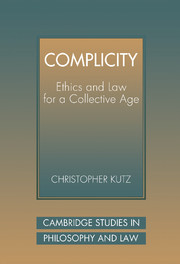Book contents
- Frontmatter
- Contents
- Acknowledgments
- 1 Introduction
- 2 The Deep Structure of Individual Accountability
- 3 Acting Together
- 4 Moral Accountability and Collective Action
- 5 Complicitous Accountability
- 6 Problematic Accountability: Facilitation, Unstructured Collective Harm, and Organizational Dysfunction
- 7 Complicity, Conspiracy, and Shareholder Liability
- 8 Conclusion: Accountability and the Possibility of Community
- Notes
- Bibliography
- Index
3 - Acting Together
Published online by Cambridge University Press: 18 March 2010
- Frontmatter
- Contents
- Acknowledgments
- 1 Introduction
- 2 The Deep Structure of Individual Accountability
- 3 Acting Together
- 4 Moral Accountability and Collective Action
- 5 Complicitous Accountability
- 6 Problematic Accountability: Facilitation, Unstructured Collective Harm, and Organizational Dysfunction
- 7 Complicity, Conspiracy, and Shareholder Liability
- 8 Conclusion: Accountability and the Possibility of Community
- Notes
- Bibliography
- Index
Summary
INTRODUCTION
Two partners plan to rob a bank. The first recruits a driver while the second purchases a shotgun from a gun dealer. The driver knows he's taking part in a robbery, although not a bank robbery. The gun dealer should have checked his customer's police record before the sale, but failed to do so. The bank is robbed, a guard is killed, and the robbers escape, only to be caught later. “They committed bank robbery,” a prosecutor will say. But does “they” include the gun dealer, whose lax standards made the robbery possible? “They conspired to rob the bank” – but does “they” here include the driver, who didn't know it was a bank they were robbing? “They killed a bank guard” – but does it matter who pulled the trigger?
These difficult questions of accountability raise issues I did not pursue in Chapter 2. There, I argued that individual accountability for individual harms depends upon the relations among agents, respondents, and harms. Warranted responses depend upon the preexisting moral and social relationships among the parties, and vary with the position of the respondent relative to the agent and the harm. But I assumed that agents were individuals acting as individuals. That is, I did not consider the accountability of groups or of individuals intentionally acting as members of groups. In this chapter I will set out and justify an analytical basis for ascribing acts to those individuals, and sets of individuals, who act together.
- Type
- Chapter
- Information
- ComplicityEthics and Law for a Collective Age, pp. 66 - 112Publisher: Cambridge University PressPrint publication year: 2000



